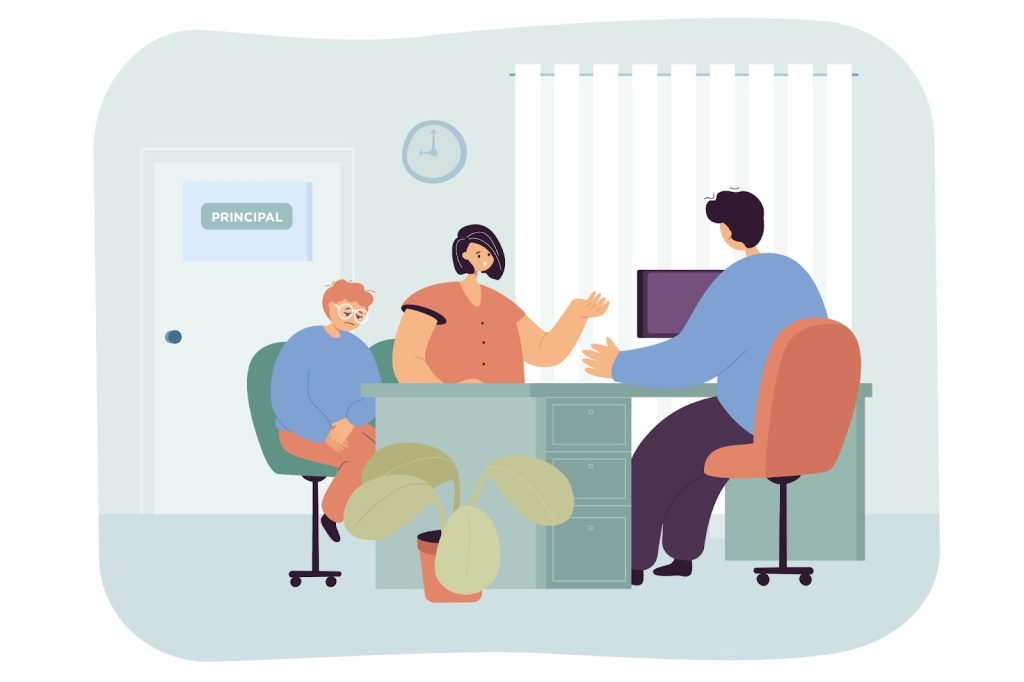A Parent-Teacher Meeting (PTM), also known as a Parent-Teacher Conference or Parent-Teacher Consultation, is a crucial event in the education system that brings together parents or guardians and teachers to discuss a student’s progress, academic performance, behaviour, and overall development.

Preparing for the Meeting
Preparing for a Parent-Teacher Meeting (PTM) is crucial for discussing your child’s progress and well-being with their teacher. Here’s a concise checklist:
- Review Work: Examine recent assignments and tests.
- Prepare Questions: Note concerns about grades, behaviour, etc.
- Consider the Child’s Perspective: Think about their challenges.
- Set Goals: Define academic and behavioural expectations.
- Bring Documents: Share special needs or support reports.
- Stay Open-Minded: Be receptive to teacher insights.
- Review Past Feedback: Reflect on previous PTMs.
- Be Punctual: Arrive on time to respect the teacher’s schedule.
- Stay Calm: Manage emotions and respect feedback.
- Plan Follow-Up: Discuss post-meeting communication.
The Parent's Role
The role of parents in a Parent-Teacher Meeting (PTM) is essential for ensuring their child’s educational success and overall well-being. Here are some key responsibilities and roles that parents should embrace during a PTM:
- Active Participation: It is crucial for parents to actively engage in the PTM by attending the meetings as scheduled. Your presence demonstrates your commitment to your child’s education.
- Effective Communication: Parents should share their insights, concerns, and questions with the teacher. Being clear and specific about the issues you’d like to discuss is essential for productive conversations.
- Listening Attentively: Give the teacher an opportunity to share their observations and feedback about your child. Actively listening, asking clarifying questions, and being receptive to their insights are vital components of effective communication.
- Collaborative Goal-Setting: Parents and teachers should work together to set academic and behavioural goals for the child. Discussing strategies to achieve these goals and establishing a plan for support is a collaborative effort.
- Creating a Supportive Environment: Parents should strive to create a supportive home environment that encourages learning. Seeking recommendations from the teacher on how to support your child’s education at home can be beneficial.
The Teacher's Role
The teacher’s role in a Parent-Teacher Meeting (PTM) is crucial for fostering a supportive educational environment. Key responsibilities include:
- Communication Facilitator: Encourage open dialogue between parents and teachers.
- Insightful Feedback: Share academic and behavioural insights about the child.
- Goal Collaboration: Work with parents to set clear goals and strategies.
- Resource Provider: Offer guidance and resources for home support.
- Problem Solver: Address concerns and collaborate on solutions.
- Feedback Receiver: Actively listen to parents’ feedback and concerns.
- Progress Updates: Keep parents informed of the child’s progress.
- Individualized Approach: Tailor teaching to the child’s needs and abilities.
- Child Advocate: Ensure the child’s well-being within the school system.
- Positive Reinforcement: Celebrate the child’s achievements and efforts.
Goal Setting and Action Plansa
Goal setting and action plans in a Parent-Teacher Meeting (PTM) are essential for addressing a child’s academic and behavioural needs:
Goal Setting:
- Identify areas of focus.
- Set specific, measurable, and time-bound goals.
- Discuss strategies with parents.
- Clarify responsibilities for implementation.
- Establish a timeline for progress review.
Action Plans:
- Break goals into manageable steps.
- Assign responsibilities to parents, teachers, and the child.
- Set deadlines for each action step.
- Identify necessary resources and support.
- Schedule regular progress reviews.
- Be flexible and adjust strategies as needed.
Conclusion
In conclusion, Parent-Teacher Meetings (PTMs) are essential events that bridge the gap between home and school, fostering collaboration between parents and teachers to support a child’s educational journey. In PTMs, parents and teachers have specific roles and responsibilities, such as effective communication, goal setting, and action planning, to ensure the child’s academic and behavioural needs are met.
FAQ's About PTM
PTMs provide an opportunity for parents and teachers to collaborate, share information, set goals, and address any concerns about a child’s education.
The frequency of PTMs can vary depending on the school’s policies. They are typically scheduled at regular intervals, such as quarterly, semi-annually, or as needed.
PTMs usually last around 15 to 30 minutes per child. However, the duration can vary based on the complexity of the discussion and the number of topics to cover.
Yes, you can request a PTM with a teacher or school if you have specific concerns or questions about your child’s education. Schools are generally open to arranging additional meetings as needed.
Benefits of PTMs
Communication and Collaboration: PTMs facilitate open and direct communication among parents and teachers. This allows in sharing facts about the scholar’s progress, strengths, weaknesses, and areas wanting development.
Student Support: PTMs permit parents and instructors to paintings collectively to perceive and address any demanding situations the scholar can be facing. This collaboration can lead to tailor-made guide techniques that cater to the student’s particular needs.
Understanding of Student’s Environment: Parents advantage insights into the study room surroundings, teaching methods, and faculty tradition via PTMs. This knowledge enables them assist their child’s getting to know and improvement extra efficiently at home.
Setting Goals: PTMs provide an possibility to set educational and behavioral desires for the pupil. By discussing goals collaboratively, mother and father and teachers can align their efforts to help the student reap these desires.
Building Relationships: Regular PTMs build trust and rapport between mother and father and teachers. This effective relationship fosters a supportive educational surroundings where every person is invested in the pupil’s success.
Related posts:
- AMC Full Form: Benefits, Components, Needs, Advantage
- ORS Full Form: Dehydration, Myths, Flavors, Varieties & Facts
- PCC Full Form: Importance, Types, Application Process
- PAN Full Form: Legal Provisions, Regulations,
- BRB Full Form: Productive, Routine, Distractions
- MCD Full From: Introduction, Responsibility, Challenges
- CT Scan Full Form: Scans, price, Advantages
- USA Full Form: History, Economics,Technology, culture




















